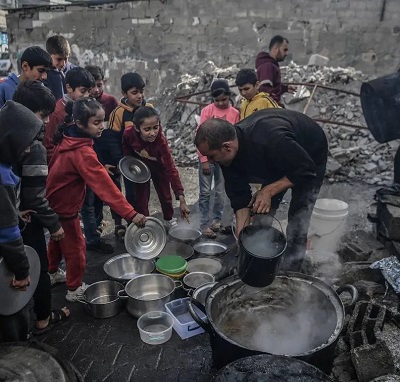United Nations, (Asian independent) UN humanitarians have warned that the availability of water for drinking and domestic use in Gaza is shrinking each day.
The municipal wells are currently at just a tenth of their production capacity prior to the escalation of hostilities — just over 21,000 cubic metre a day now, down from 255,000 cubic metre a day, the UN Office for the Coordination of Humanitarian Affairs (OCHA) quoted its humanitarian partners as saying on Friday.
Water from these wells is known to be substandard, given it is brackish. Water from the Israeli-operated lines had been the best source of safe drinking water prior to the hostilities. However, at present, only one of the three Israeli lines, the Bani Said point, is functional, yielding less than half of what would have been available if all lines were working, said OCHA.
Furthermore, water availability through the short-term desalination plants is currently at just 7 per cent of the pre-crisis capacity. Due to import restrictions on critical items, water testing kits and chlorine to treat the water across Gaza are unavailable, it added as quoted by Xinhua news agency report.
The accumulation of solid and fecal waste, which has been worsened by rains and floods, is also giving rise to severe health and environmental threats. The WHO is already reporting 152,000 cases of diarrhoea — more than half among children under the age of 5 — and the inability to do water chlorination to kill bacteria is aggravating the already concerning situation, said OCHA.
Disrupted routine vaccination activities, as well as a lack of medicines for treating communicable diseases, are further raising the risk of diseases spreading. Many people who lack access to health facilities may be going undiagnosed, indicating that the situation could be more severe than it appears. Routine surveillance systems are not currently functioning, hampering effective detection, analysis, and response to public health threats, it added.
Meanwhile, Israeli restrictions on the import of critical equipment, including communications devices, are severely compromising safe and effective aid operations anywhere in Gaza, it said.
In the north, the UN and partners are trying to increase humanitarian deliveries. But access denials by the Israeli military are preventing a scale-up. Just seven of 29 planned missions during the first two weeks of January could be fully or partially carried out. All but one of 19 missions planned to deliver medicines and fuel to health facilities and water reservoirs and wells in northern Gaza were denied during the first half of January, OCHA added.









